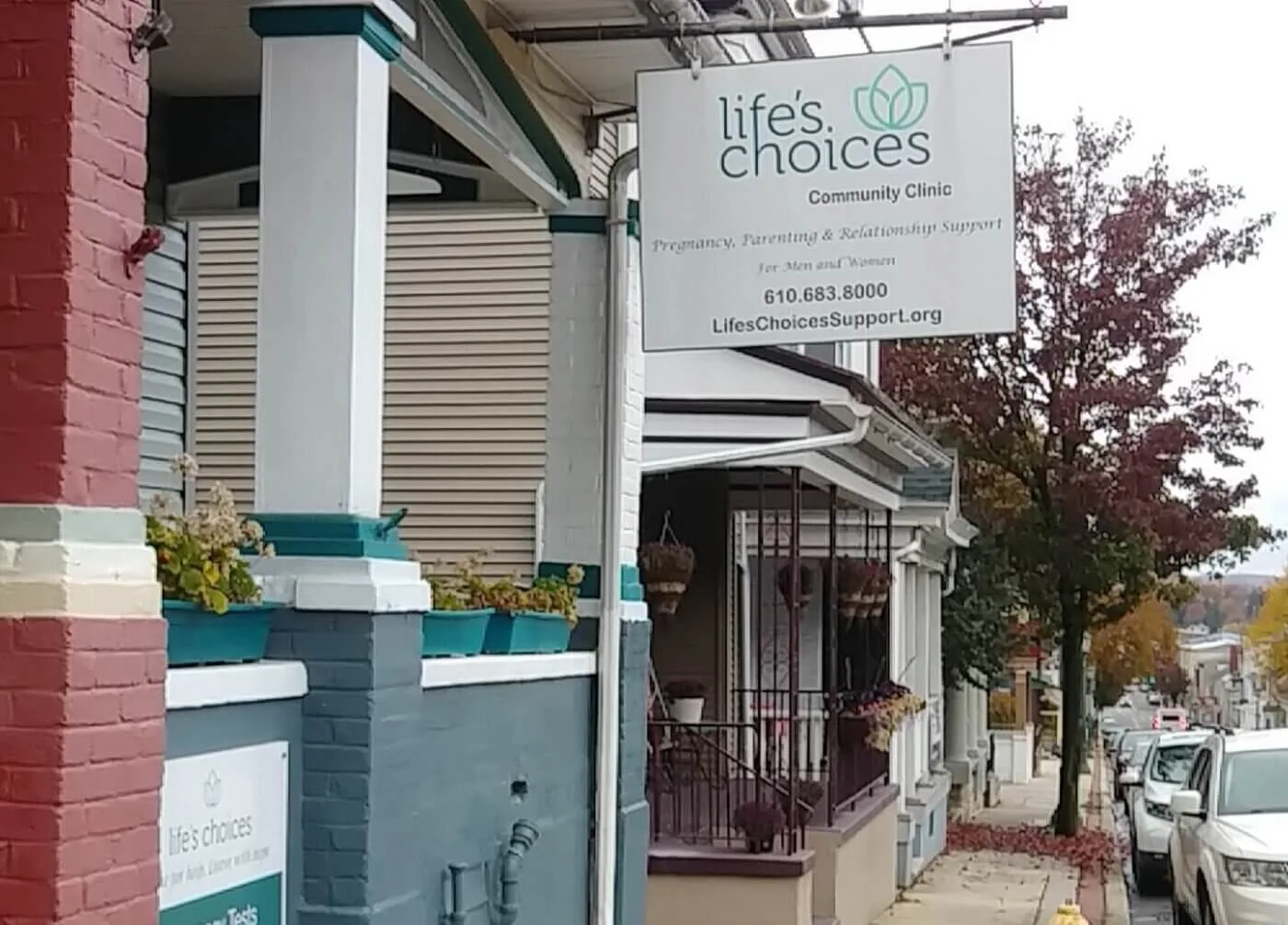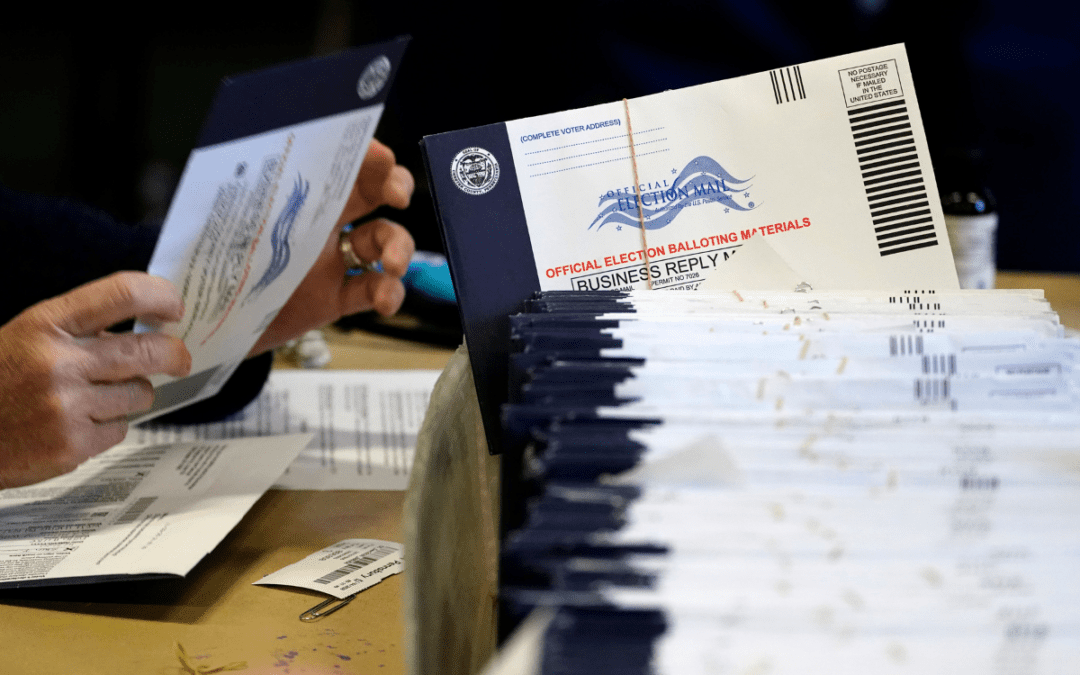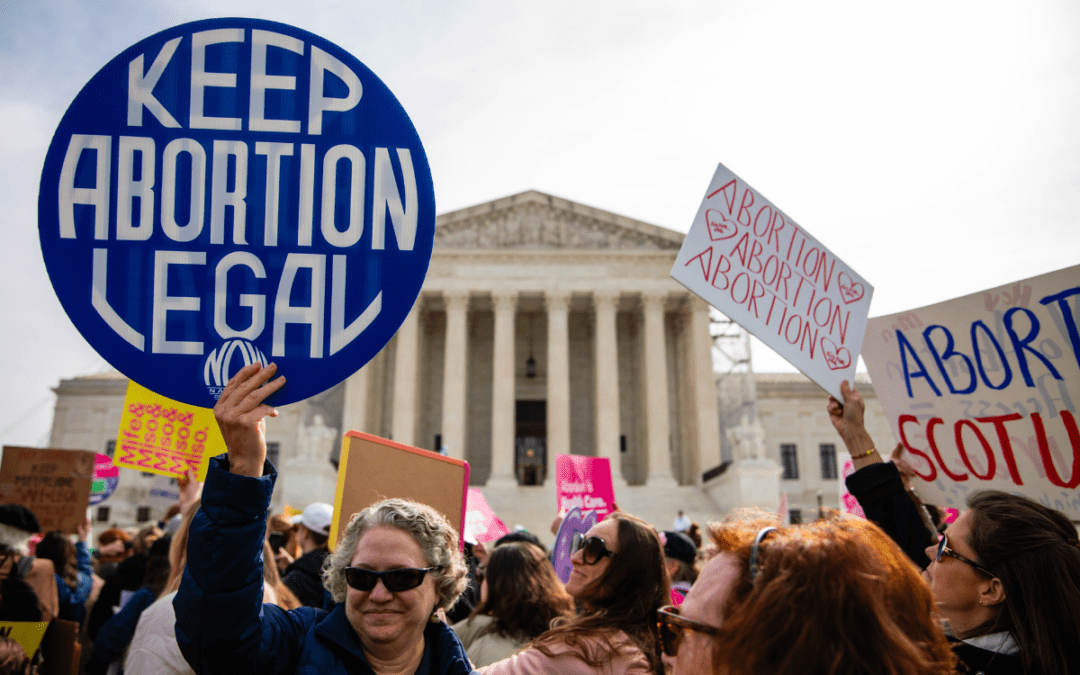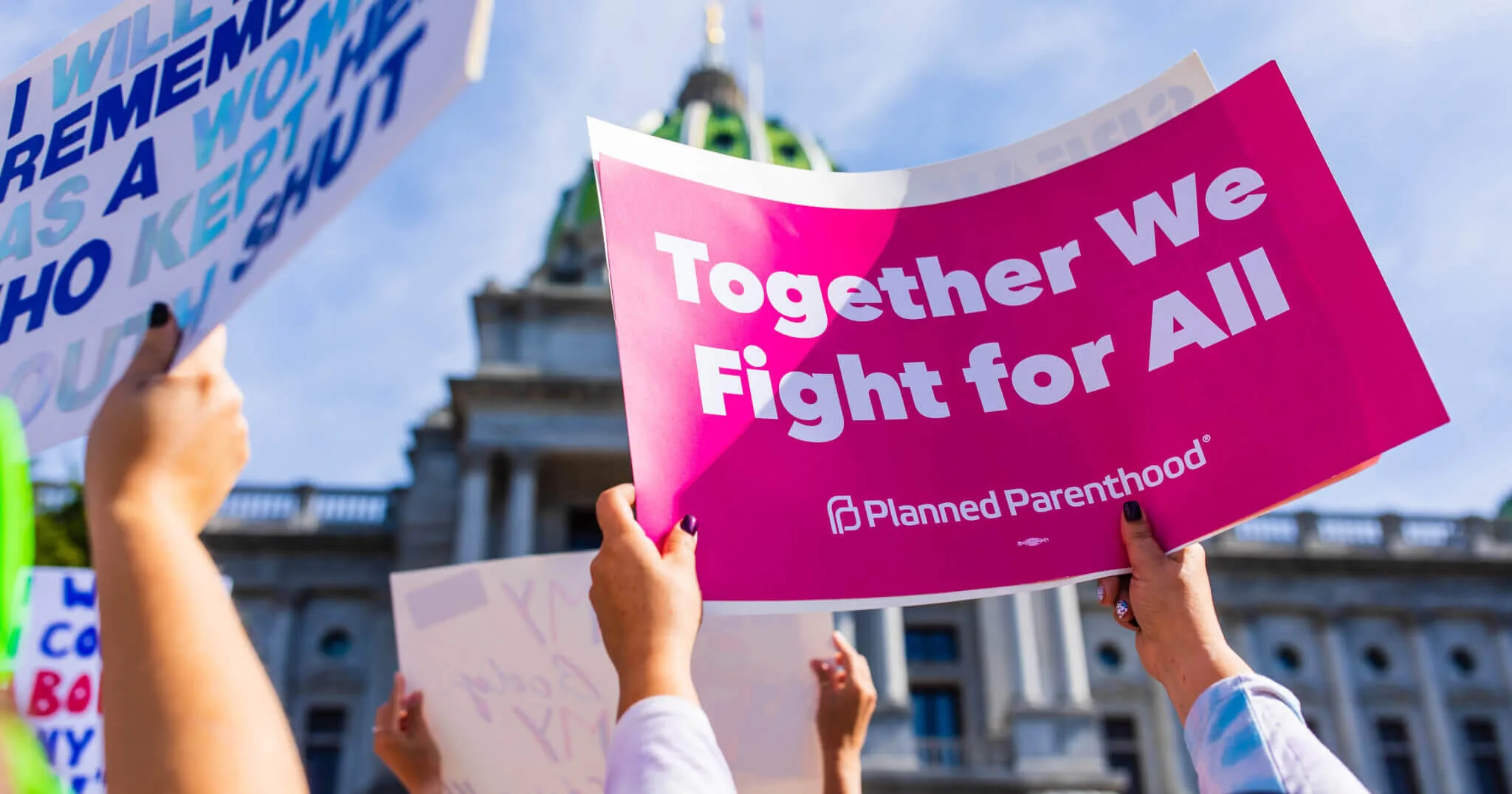
The Life's Choices crisis pregnancy center in Kutztown, Pa. (Photo: Ashley Adams)
Crisis pregnancy centers in Pennsylvania are posing as abortion care clinics. After being duped into an appointment at one, Jane* tells us what they’re like inside.
In 2010, Jane* was in her early 20s, unemployed, in a volatile relationship, and pregnant.
Jane knew she needed to start making different choices. After weighing all her options, she made the difficult decision to have an abortion. While that in itself was hard on her (and any woman put in that position), it was nothing compared to what she had to endure from the deceptive tactics of a crisis pregnancy center.
“I pride myself on being well-educated and being keyed in to these manipulative tactics used by [crisis pregnancy centers,]” Jane said, “but even I fell for them. I was really angry. I went to a place whose entire mission is to deceive women in crisis. I was devastated. It felt dehumanizing. I was not able to see through the fog and decipher what their actual purpose was. It made me feel stupid.”
They boast names like Bright Hope, Problem Pregnancy, Choices Pregnancy Center, and Women’s Choice Network in bold letters across the front of their buildings. (Note the use of the word “choice” in many.) In Jane’s case, the name of the center was Morning Star in Harrisburg. But despite promising to give her abortion information and other reproductive resources, Morning Star—like all of these facilities—are actually designed to steer women facing unwanted pregnancies away from choosing an abortion.
These facilities are called crisis pregnancy centers (CPCs) and behind the doors of what are designed to look like full-service health clinics, staff members disseminate misinformation aimed at deceiving and manipulating women seeking abortion care. Considered to be the new “foot soldiers” of the anti-choice movement, CPCs far outnumber actual abortion clinics in Pennsylvania by a ratio of 9-to-1. There are 156 CPCs in the state and only 17 actual abortion clinics, according to a study conducted by The Alliance, an organization that advocates for women’s rights and gender equality.
“I googled ‘abortion in Harrisburg’ and Morning Star was the top option that came up,” Jane said. “I thought it was a reputable abortion clinic. The website read like it was. Now, looking back on it, I can see the signs that it wasn’t, but in the moment, when I was in a difficult situation, I can see how I or someone else can be fooled.”
Jane said she made an appointment and was clear on the phone and when attending the appointment that she was committed to her decision to terminate the pregnancy. Yet, when she showed up at the office, they congratulated her on the pregnancy.
Jane was taken back for an ultrasound, where they showed her the ultrasound screen and pointed out the heartbeat and showed her the fetus on the screen. Jane was about six or seven weeks pregnant at the time.
“They also wrote ‘hi mom’ on the ultrasound screen,” Jane said. “At that point, it all clicked in my brain. I realized I wasn’t where I should be. These people were not there to help me.”
The confusion is the point
“An unexpected pregnancy can be a scary situation, and the need for prenatal care can lead many women to crisis pregnancy centers,” state Rep. Melissa Shusterman, a Democrat who represents Chester, said during a public hearing in October 2022. “However, these centers—often tied to religious organizations—offer misleading health care information from volunteers without medical qualifications. Ultimately, their aim is to delay medical procedures until it is too late to legally terminate a pregnancy, which these centers never present as an option.”
Since the US Supreme Court overturned Roe v. Wade in June 2022, sudden abortion bans and restrictions in many states have made it necessary for more people to travel to Pennsylvania for abortion services. That’s because abortion is still legal in Pennsylvania.
The influx of out-of-state patients has strained abortion clinics in the commonwealth, as patient volume has almost tripled. Appointments are harder to obtain, leaving many to fall prey to the misleading mission of CPCs.
“The powers that be need to ensure consumers are protected from sham centers that spend millions of dollars on deceptive marketing to advertise themselves as health care centers, when in fact they don’t actually provide such services,” Sen. Katie Muth, a Democrat representing Berks County, said during the same public hearing. “These deceptive practices can lead to human harm and even the death of an expecting mother because of a delay in care caused by these centers wasting precious time with sham guidance.”
The Mission of CPCs
CPCs are anti-abortion organizations that seek to reach women facing unwanted or unintended pregnancies. Their mission is to prevent women from accessing abortion services and/or contraception, said Tara Murtha, director of Strategic Communications with the Women’s Law Project of Pennsylvania.
CPCs do provide counseling and other prenatal services, but from an anti-abortion perspective, Murtha said. Most CPCs do not offer medical services and do not employ full-time medical staff but rather rely on volunteers who are not licensed or trained to deliver medical services and are not bound by medical, ethical, or regulatory standards. They lure in clients by marketing free medical services like “non-diagnostic” ultrasounds to give the false impression they offer legitimate medical services, Murtha said.
During Jane’s appointment at Morning Star, the staff commented on how pretty Jane would look as a pregnant woman, what a good mom she would make, and how adorable her baby would be.
Jane emphasized that she was committed to terminating the pregnancy. That’s when she was told she had to talk to a counselor before anything else could be done.
“I went into the counseling room and there was a woman there close to my age,” Jane said. “She talked through what just happened and told me what the size of the fetus was at the time, said this was a very serious decision to make and that a lot of women regret having an abortion. She wanted to talk about my other options, like carrying the pregnancy to term and giving it up for adoption.
“I had told them numerous times I had my mind made up and wanted an abortion. I was young and was not in a safe relationship. I did not want to be attached to that person for the rest of my life. They told me that I should just leave the relationship for me and my child.”
Jane said when the counselor realized she wouldn’t change her mind, she sent Jane to the check out desk, where she was given a package that contained the ultrasound pictures (with ‘hi mom’ written on them), a hand-knit baby blanket, and hand-knit baby hat.
“I remember when I left I was shaking and so angry at what they just put me through,” Jane said.
Since the 1960s, the primary strategy of CPCs for reaching pregnant people has been to interfere as they search for legitimate medical care, according to Ashley Underwood, director of Equity Forward, an organization that produces investigative research on reproductive rights.
Interference tactics by CPCs include opening facilities next to or near a legitimate medical provider—also called ‘co-locating’—as well as creating websites that mirror the imagery and language of legitimate medical facilities, and gaming Search Engine Optimization (SEO) so CPCs appear higher in online searches for abortion.
According to The Alliance study, the most common services offered by CPCs in Pennsylvania are pregnancy testing (88.5%) and ‘counseling’ (82.1%). The study also found that almost 65% of CPCs in the state made false and biased claims.
“CPCs are not needed,” Underwood said. “They are not medical providers and don’t provide any medical services, and they mislead people just to get them in the door.”
Jane ultimately did have her pregnancy terminated, after going to another, legitimate abortion clinic.
“There were protestors outside of the clinic,” Jane said. “I remember wondering if these were the same people at the crisis pregnancy clinic I just went to. It made me feel uneasy and unsafe.
“The whole experience made me feel more apprehensive and untrusting. I felt dehumanized. Why would people do that to someone in such a vulnerable situation? It’s sick.”
*Not her real name
**If you have had a similar experience where you’ve been deceived by a crisis pregnancy center, please reach out to Ashley at [email protected]. We can keep it anonymous, just like Jane.
Politics

Pennsylvania redesigned its mail-in ballot envelopes amid litigation. Some voters still tripped up
HARRISBURG, Pa. (AP) — A form Pennsylvania voters must complete on the outside of mail-in ballot return envelopes has been redesigned, but that did...

Biden makes 4 million more workers eligible for overtime pay
The Biden administration announced a new rule Tuesday to expand overtime pay for around 4 million lower-paid salaried employees nationwide. The...

Malcolm Kenyatta makes history after winning primary for Pa. Auditor General
State Rep. Malcolm Kenyatta, who was first elected to the state House in 2018, won the Democratic nomination for Pa. Auditor General and will...
Local News

What do you know about Wawa? 7 fun facts about Pennsylvania’s beloved convenience store
Wawa has 60 years of Pennsylvania roots, and today the commonwealth’s largest private company has more than 1,000 locations along the east coast....

Conjoined twins from Berks County die at age 62
Conjoined twins Lori and George Schappell, who pursued separate careers, interests and relationships during lives that defied medical expectations,...






